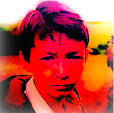 Live at the Open Door in Greenwich Village, N. Y. C., Sunday, July 26, 1953
Live at the Open Door in Greenwich Village, N. Y. C., Sunday, July 26, 1953Charlie Parker alto sax Benny Harris trumpet Al Haig piano Charles Mingus bass Art Taylor drums
1. Out Of Nowhere 3:02
2. Star Eyes 3:53
3. Cool Blues 4:42
4. East Of The Sun 3:23
5. The Song Is You 6:06
6. 52nd Street Theme (I) 2:39
7. Ornithology 3:20
8. Scrapple From The Apple 3:26
9. My Old Flame 4:18
10. My Little Suede Shoes 2:17
11. I Remember You 3:03
12. All The Things You Are 4:13
13. Just You, Just Me 1:58
14. I’ll Remember April (I) 4:15
15. Hot House 3:21
16. 52nd Street Theme (II) 3:00
17. I Cover The Waterfront 2:27
18. This Time The Dream’s On Me 4:14
19. I’ll Remember April (II)
REVIEW:
This is a recording by Bird’s wife Chan of a 4-set performance at the Open Door in Greenwich Village in July 1953. It’s mostly just the heads and Bird’s soloes and chases. The recording quality is reasonably good, at least by the standards of such amateur nightclub recordings. There’s lots of audience noise but Bird is easily heard, along with the drummer (Art Taylor). The pianist (Al Haig) and bassist (Charles Mingus) are often poorly audible. It’s a typical performance for Bird during the twilight of his career: virtuosity trumps inspiration. That’s not to say there’s no innovation: despite having heard so many of his soloes, I’m still amazed at how easily Bird inserts quotes in harmonically and rhythmically adventurous spots. But these moments are relatively few, and the overall impression is of someone trapped in his past, stitching soloes together from oft-repeated personal cliches. The lack of another horn on most of these tracks to provide a competitive stimulus may have contributed to the staleness. In fact, for someone who’s listened to a lot of Bird, some of these soloes are almost (dare I say it?) boring! Bird was by all accounts aware that he was in a musical rut: he talked of studying composition with Varese, for example; but he never progressed beyond the stage of endless reinvention of soloes on traditional vehicles like the blues and standard ballads. Other jazz greats faced a similar dilemma, and some were able to progress. For example, Duke Ellington wrote more extended concert pieces; Louis Armstrong became an ambassador of jazz, travelling for the State Department, and found some commercial crossover success late in his career; Miles Davis and John Coltrane never stopped exploring new musical frontiers. But Bird remained stuck, most likely because the demands and consequences of his heroin addiction got in the way. A little more than a year and a half after this recording he was dead, his career and home life in ruins. It’s sad to think what might have been.
Thanks to Raz - jazz is my life
This is a recording by Bird’s wife Chan of a 4-set performance at the Open Door in Greenwich Village in July 1953. It’s mostly just the heads and Bird’s soloes and chases. The recording quality is reasonably good, at least by the standards of such amateur nightclub recordings. There’s lots of audience noise but Bird is easily heard, along with the drummer (Art Taylor). The pianist (Al Haig) and bassist (Charles Mingus) are often poorly audible. It’s a typical performance for Bird during the twilight of his career: virtuosity trumps inspiration. That’s not to say there’s no innovation: despite having heard so many of his soloes, I’m still amazed at how easily Bird inserts quotes in harmonically and rhythmically adventurous spots. But these moments are relatively few, and the overall impression is of someone trapped in his past, stitching soloes together from oft-repeated personal cliches. The lack of another horn on most of these tracks to provide a competitive stimulus may have contributed to the staleness. In fact, for someone who’s listened to a lot of Bird, some of these soloes are almost (dare I say it?) boring! Bird was by all accounts aware that he was in a musical rut: he talked of studying composition with Varese, for example; but he never progressed beyond the stage of endless reinvention of soloes on traditional vehicles like the blues and standard ballads. Other jazz greats faced a similar dilemma, and some were able to progress. For example, Duke Ellington wrote more extended concert pieces; Louis Armstrong became an ambassador of jazz, travelling for the State Department, and found some commercial crossover success late in his career; Miles Davis and John Coltrane never stopped exploring new musical frontiers. But Bird remained stuck, most likely because the demands and consequences of his heroin addiction got in the way. A little more than a year and a half after this recording he was dead, his career and home life in ruins. It’s sad to think what might have been.
Thanks to Raz - jazz is my life






































http://www.mediafire.com/download.php?4f61ybyd9mzai44
ResponderEliminarThanks Raz and 7oregons2tomates for this set indeed the music speaks for it self
ResponderEliminar